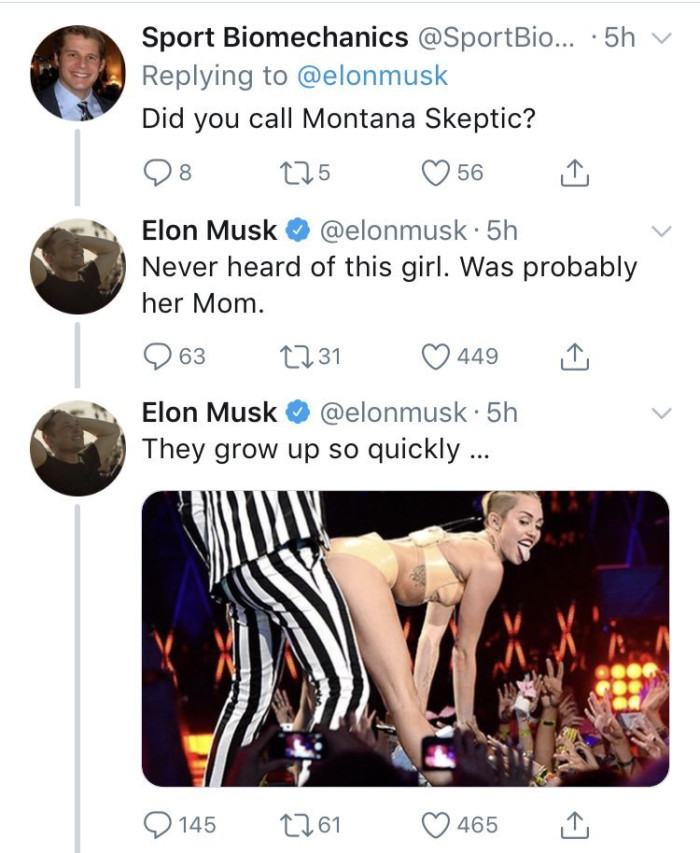Roula Khalaf, Editor of the FT, selects her favourite stories in this weekly newsletter.
What would Tesla be without Elon Musk? This is not a rhetorical question.
At about 3am in the Californian morning Thursday, the chief executive made an odd joke on Twitter, for someone running a company with a $52bn equity-market capitalisation (it's been deleted since):

Well, it would be odd for almost any other high profile chief executive. Elon Musk, however, has taken a more Trumpist approach to communications with his 22m followers -- for instance calling a rescue diver a pedophile in one exchange, for which he later apologised.
Some have seen in this approach an attempt to create a smokescreen to deflect from problems at Tesla, which is struggling to produce the mass market electric car it has long promised, at a profit.
We've also shared a theory that the billionaire may be playing eight dimensional chess. The carelessness of his attempts to deflect don't fit with his history of carefully cultivating his public image, so maybe he wants a lower stock price to take Tesla private.
Yet the tweet above is more suggestive of someone acting erratically under pressure, as are many of his other recent actions. Take for example his decision to call the family office that employs pseudonymous analyst Montana Skeptic to complain about the analyst's critical posts about Tesla, as described in a farewell post.
A gentleman and a scholar. A rare thing these days. The perfect opposite of his antagonist. The current disequilibrium is not permanent. Nature will restore the proper order. Je suis Montana Skeptic. $TSLA pic.twitter.com/3Ev27K8xOp
— TeslaCharts (@TeslaCharts) July 26, 2018
This comes after Musk proposed a bizarre journalist ranking scheme called Pravda, and abruptly cut off analysts on an earnings call: "Boring bonehead questions are not cool. Next?”
We can understand the pressure, and frustration. Tesla is trying to do something new, to make and sell an affordable electric car in mass-market volumes. It has also tried to bring an unusual amount of automation to its factories, disregarding experienced auto-industry advice.
The valuation of the company, several times its annual sales, rests on a vision not just of success but domination of the industry. Meanwhile earnings loom next week and cash appears to be tight: the WSJ recently reported that Tesla had asked suppliers to help it become profitable with reimbursements.
Meanwhile Twitter is a forum where shortsellers and critics can gleefully flag up any hint of trouble, or evidence of consumer dissatisfaction:
It's unimaginable that I'd get this kind of treatment from @BMW or @MercedesBenz. The day before delivery, and they hadn't even generated a contract in order to execute financing. #Model3 may be an innovative car but service still matters.
— Dev Bala (@devbala) July 24, 2018
We've also thrown our Billions of Blistering Barnacles series into the mix, adding to the 500,000 critical articles out there.
Historically, Telsa and Musk's reputation were as seamlessly intertwined as his corporate interests. Its cars were proof of his vision. His value to the company was so great that a $50bn compensation plan was invented to keep him interested.
Yet in an industry where rivals include an actual criminal company, VW, Tesla is surely the aspirant do-gooder's vehicle of choice. The car is fast, clean, and high-tech, so its buyers can feel like they are paying for a better future.
But if Musk's erratic behaviour continues there will come a point, once unthinkable, when Tesla's board has to consider that the disruptive car company might be better off with out the genius entrepreneur.
A final straw could be a cash crunch that forces Tesla to raise fresh equity, after Musk has said repeatedly no such fundraising would be necessary this year.
Further production difficulties could also be a catalyst. Several senior staff members have departed this year, and a controversial memo - which threatened those in the supply chain who can't keep up - described a centralisation of decision making with Musk.
The board might also consider the effects of the founder's habit of picking fights. Last month he sent an email to employees, obtained by CNBC, which accused an employee of sabotage, then sued the ex-employee, Martin Tripp, who has since retained Meissner Associates, a law firm with form, to represent him in a whistleblower complain to the Securities and Exchange Commission.
Silencing Montana Skeptic on Twitter, meanwhile, only served to draw attention to the investor's blogs on Seeking Alpha, which contain such outrages as a reasonable analysis of the gross margin effect of Tesla's in-house dealership, and how to factor that into comparisons for the profitability of automakers.
Musk has also attacked journalist Linette Lopez of Business Insider:
I’d just like to point out that right now, right this very moment, @elonmusk is going through my Facebook history and screen grabbing things to share with his friends on the internet... if you’re investing in Tesla or in a Tesla you need to sit with that. $TSLA
— Linette Lopez (@lopezlinette) July 5, 2018
Maybe none of this matters out in the real world, where a great review is far more important. Selling cars at a sustainable profit (including pesky central sales costs and research and development expenses) will make everything right.
Still, Musk's behaviour isn't what we'd expect from the world's most forward-thinking carmaker. As storied management guru Eddie Izzard once said: “Cool is a pursuit of youth, it's a fashion linked thing, being cool. It's linked to a circle. You have looking like a dickhead over here - average looking - kind of cool cool cool hip and groovy - looking like a dickhead”.
Pushing out someone who holds a fifth of the stock will never be easy, but then Travis Kalanick controlled more of Uber's voting stock before he resigned.
Without profits, Tesla will run out of cash. Earlier this year Musk joked about bankruptcy, mocking the short sellers who have long predicted it.
It's hard to imagine Tesla reaching that point, however, because of the value of the brand which could tempt another automaker to step in with a strategic injection of cash and know-how. The market leader in electric cars they'd surely want. It is less likely they would want the man who had to put his company's car production in a tent.

Comments